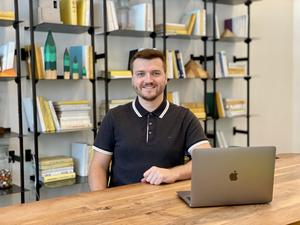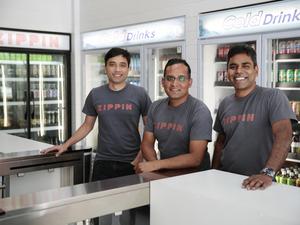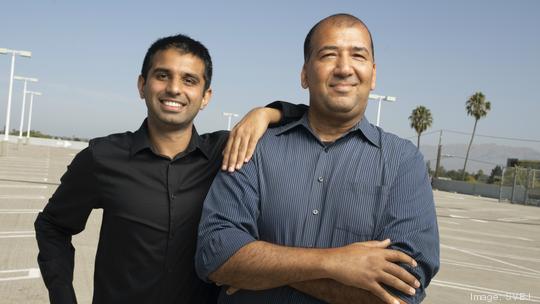
When Sameer Saran first started going to school at San Jose State University in 2016, he had a hard time finding parking.
It could take him 30 minutes to find a spot. Talking to other students, he found many were having similar trouble, and some had taken extreme measures to ensure they could get a place to park.
"They literally came at six in the morning, slept in their cars, and then went to their classes," Saran said.
His and his classmates' experience inspired Saran to try to make it easier for students to find parking. That inspiration eventually spurred him to create an app called ParkStash that helps students reserve spaces in garages, parking lots and even driveways.
Unlike many entrepreneurs these days, Saran, who enrolled at SJSU to pursue a master's degree in computer engineering, took a circuitous route to building an app. His original business plan involved placing sensors in individual parking spaces to detect whether spaces were available, said Hooman Bolandi, who co-founded ParkStash with Saran and serves as its president.
Saran pitched that idea at SJSU's Silicon Valley Business Plan Competition in 2017. That event proved to be a mixed experience for him. His idea wasn't well received, because his business plan wasn't feasible, Bolandi said.
"It wasn’t a business that was going to be profitable or investor-friendly," Bolandi said.
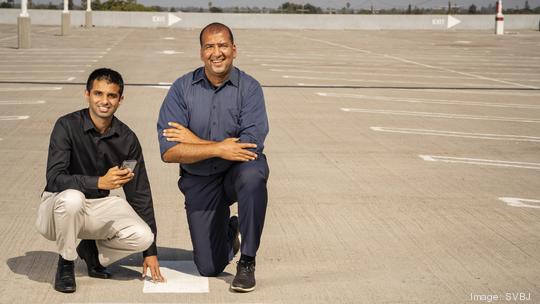
Saran made a pivot early on
On the flip side, Saran met Bolandi. A former vice president of new business and product development at Valin Corp. and, before that, a senior engineer manager at Applied Materials, Bolandi was a sponsor and judge at the competition.
He ending up giving Saran what turned out to be crucial advice, encouraging Saran to switch to a software-based solution, rather than a hardware-based one.
After that, Saran "started focusing on switching and making a pivot," Bolandi recalled.
Instead of using sensors to inform students of open spots, Saran created a mobile app that offered a kind of parking marketplace. Landowners who had extra parking places could list them on the app. Students and others in need of parking could reserve and pay for the spots through the same app.
While there are lots of other parking apps around, most of them are used to pay for metered street parking or for spots in institutionally owned parking lots or garages. ParkStash is different. In effect, Saran created what he likes to call the Airbnb of parking.
He returned to SJSU's business plan competition a year later with his new parking app and won second place. That helped launch the company of which he's now CEO. ParkStash began offering its service commercially in July 2018.
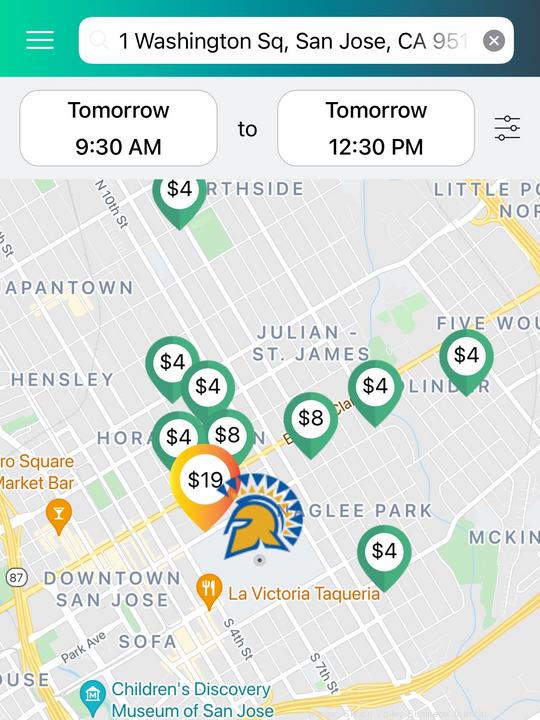
Since graduating from the school later that year, Saran's worked on the app full time. ParkStash now has six employees, most of whom work remotely. Although he and Bolandi have mostly boostrapped their startup, they have raised a small amount of seed funding from Sand Hill Angels. Now that ParkStash has a development team, Saran has handed off his coding responsibilities, but he still works on product design.
His company has multiple revenue sources. It takes a small cut of the rent property owners charge for their parking spaces. It also charges a small commission when customers pay parking citations through its app or make reservations for events. Additionally, entities like SJSU pay it a monthly subscription fee to help direct their students or customers to parking spots. Indeed, SJSU has signed a multi-year contract with ParkStash that includes not just a monthly subscription payment but also commissions on transactions.
ParkStash is popular at SJSU
About 1,400 SJSU students use the app daily to check the availability of parking places in the school's garages or to reserve private parking spots, Saran said. Since ParkStash began its partnership with SJSU in January 2019, customers have used its 288,000 times to find parking, he said.
Its service has made a big difference for SJSU students, Saran said. Students wake up in the morning, open the app and reserve a spot. That both saves them time and reduces carbon emissions, Saran said.
"If Park Stash wasn’t there, they’d be circling around at least 30 minutes," he said.
More than 300 property owners — including churches, hotels, restaurants, local businesses and individual homeowners — offer spaces through the app. Those in need of parking can choose from among more than 15,000 parking spaces.
For now, ParkStash is still largely focused on San Jose. About 48% of the spots available through its app are located in and around the city's downtown.
But the company has already expanded to serve 10 other cities, including Surrey in Canada and nine cities in Michigan as part of the annual Woodward Dream Cruise car show there. Surrey uses ParkStash as its official truck parking app, and the startup collects commissions and booking fees for the service it offers there The organization behind the Woodward Dream Cruise signed a five-year deal with ParkStash that also includes commission and booking charges. At the Dream Cruise event last month, property owners in the area listed 1,000 private parking spaces on the app.
Saran is hoping to offer ParkStash's service elsewhere soon. The company has identified numerous areas that have parking problems, including universities, cities, event centers, hospitals and apartment complexes, he said. It plans to use the data its gathered from serving SJSU customers to pitch its service to those place, he said.
"We are now engaging with these targeted entities and locations to expand," Saran said.
ParkStash's service is a 'win-win' for customers
And the company has expanded in other ways. In addition to offering parking for passenger vehicles, ParkStash now allows customers to reserve spots for commercial trucks, boats and RVs.
Richard Ajluni, who lives near SJSU, lists the driveway of his home on the app. ParkStash is simple and easy to use, he said. He also likes that the company identifies its customers and that he's able to easily toggle back and forth to see when his driveway is unavailable.
"The university doesn't have enough parking spaces for the students. Even if students buy a parking permit for the semester, there’s no guarantee they’ll have a space," Ajluni said. ParkStash's app, by contrast, is "a win-win," he said.
ParkStash is taking off in San Jose as the city is considering eliminating minimum parking requirements for new developments. Should the city go ahead with that plan, builders of new commercial office buildings would likely provide far fewer parking spots for those who work in those structures than they do today, which could make parking an even scarcer commodity.
Saran's app could help address that scarcity by freeing up already existing spaces like private driveways for public parking uses. Indeed, ParkStash's service could make new parking garages unnecessary, he said.
"We don’t need the garages if we already have the spaces," Saran said. "All of these spaces can be utilized for much better things than having more garages or more street parking spots."
ParkStash is poised to be a game-changer for generations, Bolandi said.
"It’s not your typical Silicon Valley 'I’m gonna make a gadget and call it a day,'" he said. He continued: "At the end of the day, our mission is to improve quality of life and the environment."

